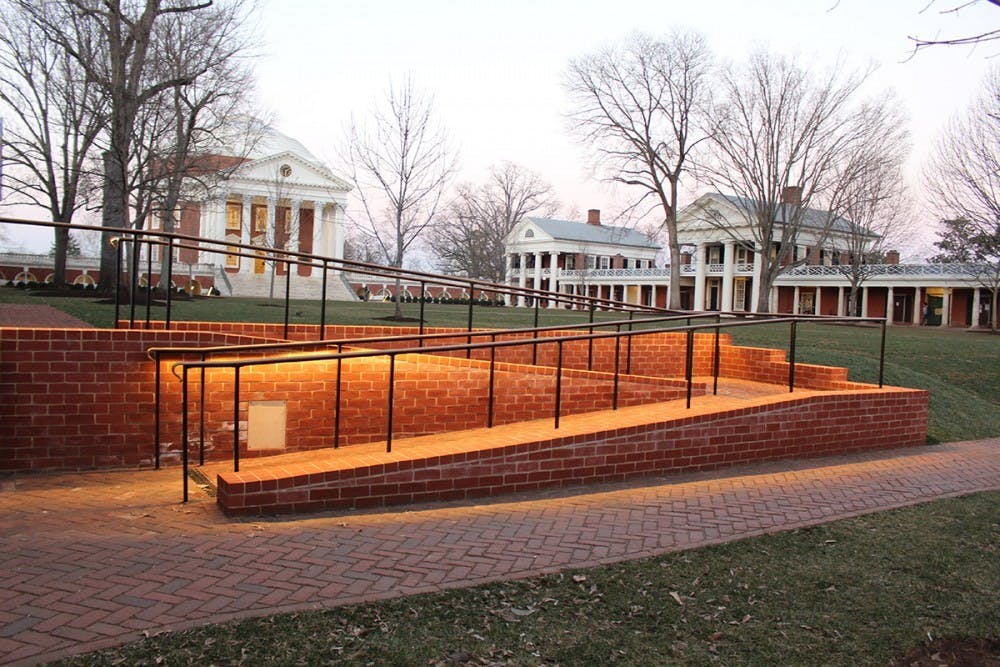As a tour guide with the University Guide Service, I have chosen to always give a no-stairs tour in an effort to address some physical constraints visitors may have. In developing the route for my tours, I discovered that many of the buildings and areas on Grounds are either not wheelchair accessible or are terribly inconvenient to access if avoiding stairs. For instance, while ramps on the Lawn were installed in 2019, just two Lawn student rooms are compliant with the Americans with Disabilities Act. Upon further research, I found that most residential buildings are only partially wheelchair accessible.
This was concerning to me — as an able-bodied individual, I’m privileged to attend a university made for bodies like mine. I never had to stop and consider how others may live and learn in the same space. Now, I am more aware of the shortcomings of accessibility on Grounds. The University should invest more money in achieving complete accessibility so those with mobility disabilities can access the same areas and resources as every other student.
For those who are hearing impaired, there are only five buildings on Grounds with rooms equipped with the recommended assistive learning system — a hearing loop or induction loop. This system sends sound directly from a speaker’s microphone, or any audio source, to a hearing aid. While these systems have a steeper cost and require modifying the infrastructure of the building, the University must consider these accommodations a necessity, rather than an option or afterthought.
Accessibility does not just encompass physical access. Mental accessibility and health are just as important — especially in the midst of a global pandemic. The COVID-19 pandemic has exacerbated the mental state of college students across the country and online learning comes with its own myriad of issues.
Students frequently call upon the University's primary mental health resource, Counseling and Psychological Services, to improve its accessibility. As opinion columnist Grace Duregger cited, CAPS only staffs one therapist for every 1,080 students. Coupled with long wait times, CAPS is not equipped to handle students experiencing mental health issues and crises — particularly in a timely manner. The Maxine Platzer Lynn Women’s Center provides fantastic, free therapy, but has a waiting list longer than one semester.
Students without insurance or limited coverage may find resources are inaccessible on the basis of cost or space. For example, those experiencing academic difficulties who want to be tested for learning disabilities might have to go outside the University for testing. The University has two clinics that offer learning disability and Attention Deficit-Hyperactivity Disorder testing — one has “very limited” space, and the other has an average cost of $2,500 for assessments. These barriers to testing are harmful to students who need accommodation to learn at the University.
Some solutions to increasing accessibility are quite simple and have been successfully implemented already. For example, online lectures help those with a range of accommodation needs. Using Zoom or other platforms provides numerous benefits with limited inconvenience to the teacher. Being able to watch a recorded lecture allows students to spend more time with the material if needed since they can replay as much as needed. Additionally, those who are hearing impaired, or who just miss something, will have access to readily available Zoom captions. Additionally, those who don’t need accommodation also appreciate the flexibility online learning provides. The University must continue hybrid learning to meet a wide range of student needs.
The barriers that exist on Grounds to physical accessibility, educational accommodation and mental health resources make our University exclusive and designed for only certain students. The University must provide better care and resources for its students, as mental and physical health affect all other aspects of life. Learning should be convenient for all, and the University should direct its well-endowed means toward making Grounds truly accessible.
Nicole Chebili is an Opinion Columnist for The Cavalier Daily. She can be reached at opinion@cavalierdaily.com.
The opinions expressed in this column are not necessarily those of The Cavalier Daily. Columns represent the views of the authors alone.







